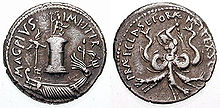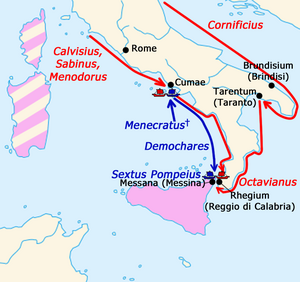Sextus Pompey
Sextus Pompey | |
|---|---|
| Battles/wars | Caesar's civil war Bellum Siculum |
Sextus Pompeius Magnus Pius (c. 67 – 35 BC), also known in English as Sextus Pompey, was a Roman military leader who, throughout his life, upheld the cause of his father, Pompey the Great, against Julius Caesar and his supporters during the last civil wars of the Roman Republic.
Sextus Pompey formed the last organized opposition to the Second Triumvirate, in defiance of which he succeeded in establishing an independent state in Sicily for several years.
Biography

Sextus
When Caesar crossed the

Caesar won the first battle at Thapsus in 46 BC against Metellus Scipio and Cato, who committed suicide.[2] In 45 BC, Caesar managed to defeat the Pompeius brothers in the Battle of Munda, in Hispania (the Iberian Peninsula, comprising modern Spain and Portugal), after what he himself described as his hardest fought victory ever.[3] Gnaeus Pompeius would soon die in a last stand at Lauro, but young Sextus escaped once more, this time to Sicily, and thereafter raised another dissident army in Spain.[2]
Back in Rome, Julius Caesar was killed on the
Brutus and Cassius lost the twin battles of Philippi and committed suicide in 42 BC. After this, the triumvirs turned their attentions to Sicily and Sextus.

↗ — actions of Sextus Pompey and his admirals.
However, Sextus was by now prepared for strong resistance. In the following years, military confrontations failed to return a conclusive victory for either side, although in 40 BC Sextus' admiral, the

↗ — actions of Caesar Octavian and his commanders;
↗ — actions of Sextus Pompey and his commanders.
The peace did not last for long. In Antony's absence, Octavian renewed the conflict against Sextus. Sextus and Octavian accused each other of violating the terms of the Pact of Misenum, but the final straw was the betrayal of Sardinia to Octavian by Menas. Octavian was defeated in the naval battle of
Agrippa spent the winter training a navy on land and building a fleet near
Sextus Pompeius was finally captured in 35 BC, and executed without trial in Miletus by Marcus Titius, whom Sextus had once spared; either by his own initiative or possibly on the orders of Antony or Plancus.[8][9] Although Octavian later pretended that the execution without a trial of Sextus was illegal because Sextus was a Roman citizen, Octavian himself had declared Sextus an outlaw without citizen rights.
Family connections
Sextus had married Scribonia, a distant relative. She was the daughter of Lucius Scribonius Libo, consul of 34 BC and the niece of another Scribonia, the second wife of Octavian. Sextus and Scribonia had a daughter, their only child, called Pompeia Magna. As an affine to both Sextus and Octavian, Scribonius Libo had played a role in brokering peace between Sextus and the Triumviri, and had very reluctantly abandoned Sextus in 36/35, in return for which he had received the consulship.
Chronology
- 48 BC – in Egypt with his father, who is assassinated
- 47/45 BC – resistance in Africa
- 45 BC – his brother, Gnaeus, is defeated at Munda, Sextus continues resistance
- 42 BC – controls Sicily with a powerful navy
- 39 BC – pact of Misenum with Octavianus and Antony
- 37 BC – defeats Octavian off Messina
- 36 BC
- August, defeats Octavian
- September, defeated by Agrippa off Naulochus (Sicily)
- 35 BC – captured and executed in Asia Minor (Miletus)
Historiographical readings
Where Plutarch gives Sextus only a minor role in the confused events surrounding the fall of the Roman Republic, Appian sees him as a more central figure, who might even have emerged as the final victor, so as to establish a dynasty of Pompeys, not Caesars.[10]
Dramatic representations
- Shakespeare had Sextus Pompey as a major character in his play Antony and Cleopatra(1606–07).
- British actor BBC Shakespearetelevision production of Antony and Cleopatra.
- American actor Walter Koenig portrayed Sextus Pompey in the 1983 Bard Productions television production of the play.
- British actor
- Sesto (Italian for Sextus) appears as main character in 1682 opera titled Il Pompeo by Italian baroque composer Alessandro Scarlatti.
- Sextus ("Sesto" in Italian) appears in Giulio Cesare in Egitto ("Julius Caesar in Egypt"). The opera attributes to Sextus the killing of the Egyptian King Ptolemy XIII, who had killed his father Pompey. This is not historically attested.
References
- ^ a b c d e Jones, Tom B (1976). "Pompeius Magnus, Sextus". In William D. Halsey (ed.). Collier's Encyclopedia. Vol. 19. Macmillan Educational Corporation. p. 234.
- ^ a b c d Sextus Pompeius
- ^ R Warner transl., Plutarch: Fall of the Roman Republic (Penguin 1958) p. 263
- ^ D R Shakleton Bailey trans., Cicero's Letters to his Friends (Atlanta 1988) p. 489
- ^ D R Shakleton Bailey trans., Cicero's Letters to his Friends (Atlanta 1988) p. 550
- ^ Tacitus, The Annals of Imperial Rome (Penguin 1966) p. 36
- ^ J Griffin ed., The Oxford History of the Classical World (Oxford 1986) p. 533
- ^ Appian, Bellum Civile, 5.14.144
- ^ Ronald Syme, The Roman Revolution, pg. 232. Oxford University Press, 2002 reprint
- ^ B Breed, Citizens of Discord (2010) p. 279-80
Further reading
- ISBN 978-0231890342.
- de Méritens de Villeneuve, Guillaume (2023). Les fils de Pompée et l'opposition à César et au triumvirat: 46–35 av. J.-C. Rome: École française de Rome. ISBN 978-2728316113.
- Powell, Anton; Welch, Kathryn (2002). Sextus Pompeius. Classical Press of Wales. ISBN 978-1-914535-19-2.
- Rowan, Clare (2018). From Caesar to Augustus (c. 49 BC–AD 14): Using Coins as Sources. Cambridge University Press. ISBN 978-1-108-67976-3.
- Schor, Bruno (1978). Beiträge zur Geschichte des Sextus Pompeius (in German). Hochschulverlag. ISBN 978-3-8107-2015-3.
- Welch, Kathryn (2012). Magnus Pius: Sextus Pompeius and the Transformation of the Roman Republic. Classical Press of Wales. ISBN 978-1-910589-15-1.
External links
![]() Media related to Sextus Pompeius at Wikimedia Commons
Media related to Sextus Pompeius at Wikimedia Commons
- Sextus Pompey – biography at unrv.com
- Coins of Sextus Pompeius
